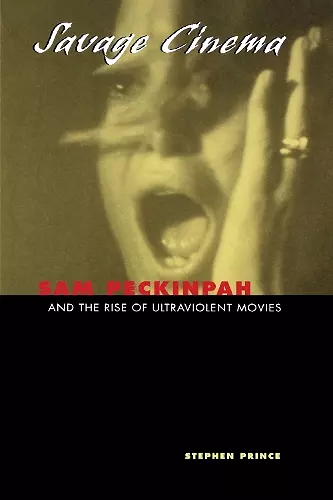Savage Cinema
Sam Peckinpah and the Rise of Ultraviolent Movies
Format:Paperback
Publisher:University of Texas Press
Published:1st Oct '98
Currently unavailable, and unfortunately no date known when it will be back

"...an extraordinary work ...beautifully written ...Prince has recuperated Peckinpah's reputation as one of the most important artists of the postwar American cinema-perhaps the crucial link between late classical and postmodern Hollywood." -- David A. Cook, Director, Film Studies Program, Emory University, and author of History of Narrative Film
Stephen Prince explains the rise of explicit violence in the American cinema, its social effects, and the relation of contemporary ultraviolence to the radical, humanistic filmmaking that Peckinpah practiced.
More than any other filmmaker, Sam Peckinpah opened the door for graphic violence in movies. In this book, Stephen Prince explains the rise of explicit violence in the American cinema, its social effects, and the relation of contemporary ultraviolence to the radical, humanistic filmmaking that Peckinpah practiced.
Prince demonstrates Peckinpah's complex approach to screen violence and shows him as a serious artist whose work was tied to the social and political upheavals of the 1960s. He explains how the director's commitment to showing the horror and pain of violence compelled him to use a complex style that aimed to control the viewer's response.
Prince offers an unprecedented portrait of Peckinpah the filmmaker. Drawing on primary research materials—Peckinpah's unpublished correspondence, scripts, production memos, and editing notes—he provides a wealth of new information about the making of the films and Peckinpah's critical shaping of their content and violent imagery. This material shows Peckinpah as a filmmaker of intelligence, a keen observer of American society, and a tragic artist disturbed by the images he created.
Prince's account establishes, for the first time, Peckinpah's place as a major filmmaker. This book is essential reading for those interested in Peckinpah, the problem of movie violence, and contemporary American cinema.
"...an extraordinary work ...beautifully written ...Prince has recuperated Peckinpah's reputation as one of the most important artists of the postwar American cinema-perhaps the crucial link between late classical and postmodern Hollywood." David A. Cook, Director, Film Studies Program,Emory University, and author of History of Narrative Film
ISBN: 9780292765825
Dimensions: unknown
Weight: 454g
304 pages